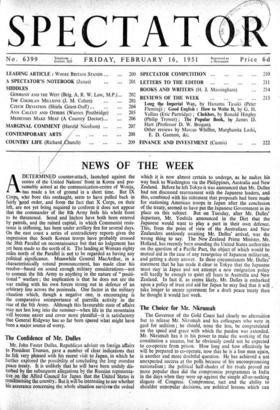The Confidence of Mr. Dulles
Mr. John Foster Dulles, Republican adviser on foreign affairs to President Truman, gaye a number of clear indications that he felt very pleased with his recent visit to Japan, in which he further explored the possibility of concluding the long overdue peace treaty. It is unlikely that he will have been unduly dis- turbed by the subsequent allegations by the Russian representa- tive on the Allied Council for Japan that the United States is remilitarising the country.. But it will be interesting to see whether his assurance concerning the whole situation survives' the ordeal which it is now almost certain to undergo, as he makes his way back to Washington via the Philippines, Australia and New Zealand. Before he left Tokyo it was announced that Mr. Dulles had not discussed rearmament with the Japanese leaders, and this, combined with his statement that proposals had been made for stationing American troops in Japan after the conclusion of the treaty, seemed to have put the Japanese Government in its place on this subject. But on Tuesday. after Mr. Dulles' departure, Mr. Yoshida announced in the Diet that the Japanese would want to play a part in their own defence. This, from the point of view of the Australians and New Zealanders anxiously awaiting Mr. Dulles' arrival, was the wrong thing to say. The New Zealand Prime Minister, Mr. Holland, has recently been sounding the United States authorities on the question of a Pacific Pact, the object of which would be mutual aid in the case of any resurgence of Japanese militarism, and getting a dusty answer. In these circumstances Mr. Dulles' statement that he has made it clear in Tokyo that the Japanese must stay in Japan and not attempt a new emigration policy will hardly be enough to quiet all fears in Australia and New Zealand. In fact if, as seems likely. Mr. Dulles is embarked upon a policy of trust and aid for Japan he may find, that it will take longer to secure agreement for a draft peace treaty than he thought it would last week.


































